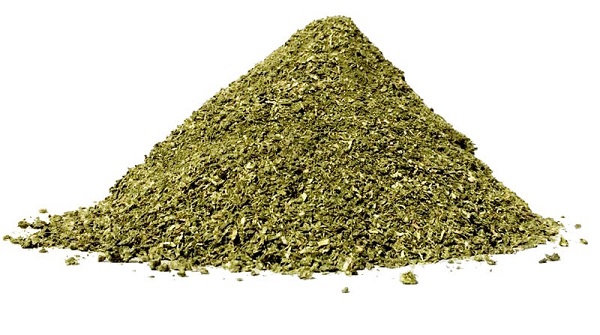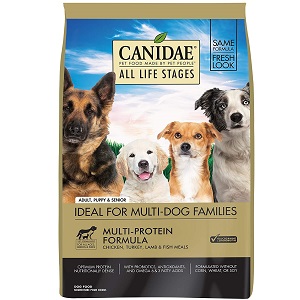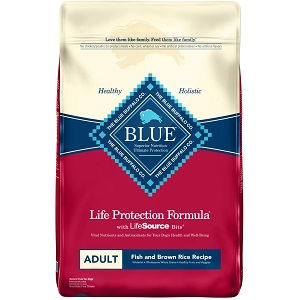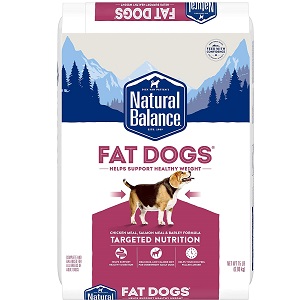Dogs are omnivores just like humans. They are quite good at adapting human food as well.
With the known benefits of alfalfa for humans, as a pet parent, it’s obvious to have some curiosity regarding its utilization in dog food.
Since dogs have certain biological needs that are different from humans, if you are planning for an alfalfa-influenced diet for your dogs it is important to know its good and bad side for your pooch.
Alfalfa meal is a plant-based protein you can include in dog’s food but not manually. You need to be a bit cautious.
This is because it is not healthy for dogs when consumed directly. But some amount of alfalfa when combined with other dog foods has amazing health benefits for dogs.
So before we dive into the health benefits of alfalfa it is better to have some information on what alfalfa meal is, and if your dog really is in need of an alfalfa meal.

Contents
What is Alfalfa Meal ?
Alfalfa, also called Lucerne is a forage crop with a lot of nutritive value and is specifically reserved to be utilized for productive and sensitive ruminant animals.
Once dried, grounded, and often pelleted it is called alfalfa meal. According to Wikipedia “Alfalfa hay is a widely used protein and fiber source for meat rabbits.” It is used in combination with different meat meals for certain monogastric omnivores like rats, dogs, and pigs.
Even it is healthy for monogastric herbivores like horses, rabbits, etc due to the high amount of protein content in it.
In the Middle East alfalfa is known as the father of all herbs. This is because of its excellent nutritional benefits for humans and animals. It looks more like cloves, but actually is a member of the pea family.
It contains a lot of nutrients that are essential for the healthy growth of dogs and cattle.
It contains a considerable amount of protein. It is also a rich source of different vitamins and minerals like calcium, magnesium, potassium, beta carotene, and vitamin A, B12, C, D, E, and K.
It contains a high amount of antioxidants. So it is used as a dietary herb for many animals.
his makes it an essential ingredient in high-quality dog foods like CANIDAE Premium Dry Dog Food in combination with animal protein.

We see many dog food brands adding a specific amount of alfalfa leaves to dog food. Doing so increases their nutritional content.
Despite having a high amount of protein it is still necessary for all pet parents to know if it is really essential and safe for their dogs or not.
Here’s all about alfalfa meal in dog food.
Alfalfa Meal and Dogs
Considering feeding your pooch alfalfa meal will require some research about the herb, its benefits and side effects on dogs.
Veterinarians often recommend avoiding the high amount of alfalfa meal in a dog’s diet and so you will find dog food products containing trace amounts of alfalfa and not as the primary ingredients.
When used as a supplement is safe and healthy for puppies and dogs, but feeding them just alfalfa has some risks as well.
Is Alfalfa Meal safe For your Pooch?
Yes, alfalfa is safe for some dogs and not all. You need to check your dog’s health condition before feeding it alfalfa meals. So, before you plan to include alfalfa meals in your dog’s diet knowing if it’s safe for your pet friend is extremely important.
Dogs with Endocrine Issues
Alfalfa is a herb that contains a higher amount of phytoestrogens. This compound naturally occurs in plants.
Consumption of alfalfa in higher amounts for dogs with endocrine issues can disturb the thyroid functioning of your dog.
Hence, vets prescribe extremely less or no consumption of alfalfa for dogs that have endocrine issues.
Dogs with Weak Immune System
Sometimes low-quality alfalfa meals are not made with utmost caution and hence contain seeds in them. Alfalfa seeds have toxic amino acids.
These amino acids can cause an allergic reaction in dogs that have a weak immune system. So if your pooch is sick or has weak immunity it is better to avoid feeding alfalfa meal.
If your dog does not have either of the two health issues, alfalfa is an extremely safe and healthy supplement for the dog when consumed appropriately.
Also, it is mandatory to include alfalfa along with high-quality meat meals like Blue Buffalo Life Protection Formula.
This dog food formula contains a good amount of protein and nutrient content. Feeding it in a higher proportion to dogs can do more bad than good.

Benefits of Alfalfa Meals for Dogs
Before we start with the benefits of Alfalfa for dogs, it is essential to note that we recommend alfalfa as a supplement to a processed food diet.
Here are the few benefits you should know about feeding dog food with alfalfa meals in appropriate proportion to your dog.
Rich source of Vitamin
Alfalfa contains different vitamins and minerals that are extremely beneficial for your dog’s health in different ways.
It contains calcium, magnesium, potassium, beta carotene, vitamins A, B12, C, D, E, and K. These nutrients make alfalfa a perfect dietary herb for dogs.
Arthrities
Dogs with arthritis are often recommended consumption of alfalfa by veterinarians.
Daily consumption of alfalfa gives long-term relief from joint pain due to its natural anti-inflammatory properties. Hence, it is one of the most recommended dietary supplements to relieve joint pain.
Improved Digestion
Alfalfa is a beneficial dietary ingredient in dog food as it improves digestion. It can also treat disorders of the digestive tract and kidneys.
Its alkalizing effect helps balance the acidic nature of urine that causes irritation in the bladder and other such issues in dogs.
Hence, its good proportion of minerals and enzymes are extremely beneficial for the digestive health of dogs.
Improved Coat and Skin
As it contains a pretty good amount of antioxidants its adequate consumption improves blood and blood circulation. This works as a quick solution to the skin issues of dogs as well.
Protection from Cancer
There are many cancer-fighting compounds present in alfalfa that helps inactivate carcinogens in dogs’ liver and small intestine. These anti-inflammatory compounds help prevent dog cancer.
Now that you know the different health benefits your dog will enjoy here’s how you can feed alfalfa meals to your dog.
How to use Alfalfa Meals in Dog Food?
First thing first, alfalfa is not to be fed individually as it can have more side effects when consumed in a larger proportion. As Per naaic “One of the most important characteristics of alfalfa is it’s high nutritional quality as animal feed. Alfalfa contains between 15 to 22% crude protein as well as an excellent source of vitamins and minerals.” Also, it is not an alternative to meat meals for dogs despite having high protein content.
Instead, try getting dog food with some amount of alfalfa in that. Many dog food brands like Natural Balance dry dog food, add alfalfa in a dog with chicken meals and other animal proteins to balance the protein content in dogs.

In case your dog is allergic to other dog food ingredients, what you can do is sprinkle a pinch of alfalfa meal or leaves powder on your dog’s food, either wet or dry once a day.
If you buy capsules that are sold for human consumption consult a vet as they can better recommend the proportion depending on your dog’s weight, age, and breed. It is always advisable to start slowly as dogs take time to adjust and digest any new supplement.
Also, remember that it is a medicinal herb and not a plant so make sure to maintain an adequate proportion as you do not want to trouble your dog.
Either an adult or puppy, consumption of alfalfa is always safe and healthy when consumed in a specific proportion.
FAQs About Alfalfa Meals for Dog
Is alfalfa meal good for dogs?
Yes, when consumed in adequate proportion alfalfa have different health benefits for dogs. But as a pet parent, it is advisable to know that your dog isn’t allergic to some compounds like toxic amino acids, phytoestrogens, etc present in alfalfa.
Can alfalfa meal have any side effects on dogs?
Depends upon the amount of alfalfa you feed your dog. If it is not in the top five ingredients of dog food it likely will have no side effects on your dog’s health.
Why does dog food have dried alfalfa meal?
If alfalfa is not fed to dogs in dried form it can cause nausea or gastritis in dogs. And so dog foods always have dehydrated alfalfa meal as it is a good source of protein and soluble fibers in vegetarian dog food.
What are the side effects of higher consumption of alfalfa in dogs?
Feeding your dog more amount of alfalfa may lead to sun sensitivity, issues with thyroid glands, digestion, etc. Hence, it is advisable to feed an adequate amount of alfalfa to your dogs.
Conclusion
If you are planning a diet change for your dog’s better health, including some amount of alfalfa meal could just boost its healthy growth.
But you need to make sure that the diet includes a tiny amount of alfalfa meal. It is not a replacement for meat meals despite having high protein content in it.
So if you are feeding alfalfa meals through different dog foods available in the market make sure alfalfa meal is not in the top five ingredients.
References:
- Staff, A. (2022d, March 2). How to Switch & Transition Dog Foods. American Kennel Club.
- Cohen, B., I. (1990, March 1). The effect of alfalfa-corn diets on cholesterol metabolism and gallstones in prairie dogs. SpringerLink.
- Heseltine, J. C. (2003, September 15). Systemic candidiasis in a dog. AVMA.
- Tupler, T. D. (2022, August 16). Dog Nutrition: Guide to Dog Food Nutrients. PetMD

Julia is a Board Certified Veterinary Nutritionist, practicing veterinarian in a non-profit animal hospital and feline sanctuary located in Rochester, NY. She is also a full-time veterinary advisor at DogLikesBest. She focuses on writing healthcare-related topics including dog foods, treats, veterinary diets, food for specific healthcare features, etc. Moreover, any article on DogNeedsBest that has to concern feline health in any way, goes under her scrutiny before being published.


